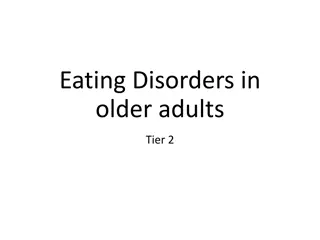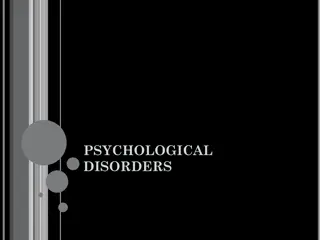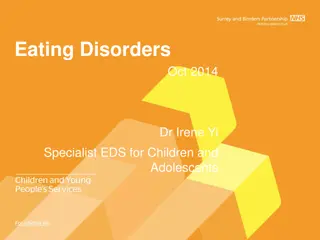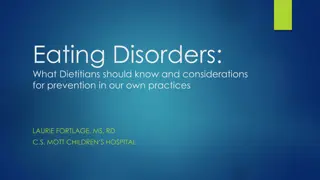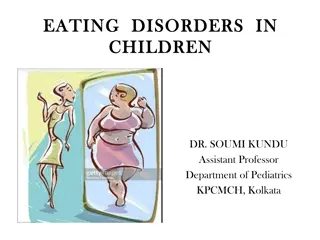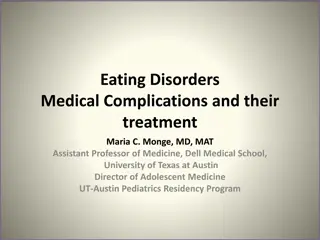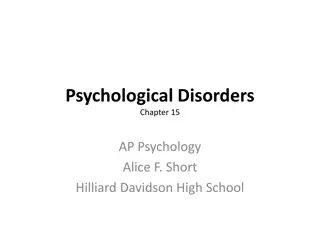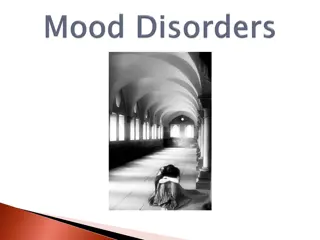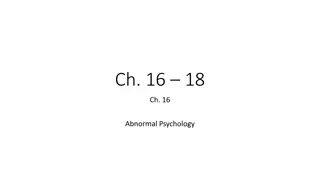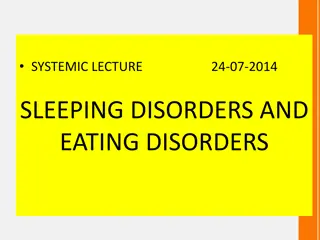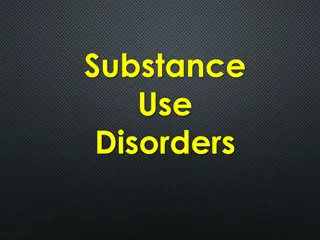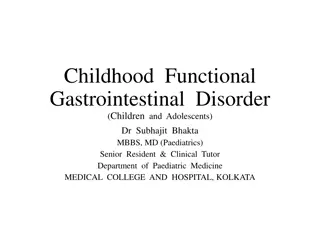History of Psychological Disorders and Treatment Methods
The chapter delves into the terms and history of psychological disorders, covering aspects like prevalence, incidence, sex ratio, age of onset, prognosis, etiology, and early beliefs surrounding mental illness. It explores the influence of figures such as Hippocrates and Galen, as well as advancements in understanding conditions like hysteria and syphilis in the 19th century.
Download Presentation

Please find below an Image/Link to download the presentation.
The content on the website is provided AS IS for your information and personal use only. It may not be sold, licensed, or shared on other websites without obtaining consent from the author. Download presentation by click this link. If you encounter any issues during the download, it is possible that the publisher has removed the file from their server.
E N D
Presentation Transcript
Terms and History Chapter 1
Terms Presenting problem Clinical description- behaviors, thoughts, feelings Prevalence: How many people in the population as a whole have the disorder Incidence: How many new cases occur during a given period (such as a year) Sex ratio: what % males and females Age of onset Course- of a disorder (e.g., episodic)
Terms Acute onset Insidious onset Prognosis: anticipated course of a disorder Developmental: e.g., physical symptoms Etiology: origins- why a disorder begins (bio, psycho, social) Cause and effect; random assignment, cross-sectional data
Early views Demons and witches- exorcism Stress and melancholy (depression)- seen as natural and curable- illness Church: despair and lethargy were seen as the sin of sloth Rest, sleep, healthy environment, baths, ointments, potions Moved from house to house as neighbors took turns caring for them (beneficial) Mass hysteria- today: emotion contagion (e.g., mob psychology; suggestibility; if there is a cause than I should feel this way; e.g., test anxiety)
Hippocrates and Galen Hippocrates: father of modern western medicine; psychological disorders can be treated like any other disease Hippocrates and Galen: Humors: 4 bodily fluids: blood (heart), black bile (spleen), yellow bile (liver), and phlegm (brain) Disease happens when humors are not in balance (e.g., depression melancholier, black bile) Psychological disorders as chemical imbalance Greek word for uterus is hysteron; idea of hysteria (somatic symptom disorders; paralysis/blindness with no physical cause, primarily in women); thought empty uterus was wandering
19thCentury Syphilis: bacterial microorganism entering the brain: behavioral and cognitive symptoms (like psychosis- paranoia and delusions) Subgroup of patients who deteriorate and die within 5 years Another group that remains stable Louis Pasteur s germ theory of disease (1870)- identification of microorganisms Malaria- burned out the bacteria until penicillin cures; curable infection John P Grey: causes of insanity were always physical Rest, diet, proper room temp and ventilation Conditions in hospitals became more humane Became so large that individual attention was not possible De-hospitalization in the 50s with no infrastructure
Treatments Biological treatments- electric shock (electro-convulsive therapy), brain surgery, drugs (psychotic disorders) Drug therapy- initial enthusiasm followed by disappointment: side effects, modest effects IF disease- do we focus on treatment? Curable? (vs classification and dx) Moral therapy: treat patients as normal as possible (asylums became more therapeutic) Asylum reform: Dorthea Dix; improve care, get care to everyone who needed it Increases in patients; reduction in moral therapy; brain pathology and thus incurable
Treatments cont Psychoanalytic theory and psychoanalysis Humanism Behaviorism
Psychoanalytic Theory Freud teamed up with Breuer- hypnotized patients talked about problems, conflicts, fears; felt better when they emerged had trouble remembering details (beyond awareness of patients) Unconscious mind Release of emotional material- catharsis Insight- understanding current emotions and earlier events Id (drives), Ego (reality), Superego (moral principles) Defense Mechanisms (denial, displacement, projection, rationalization, reaction formation, repression, sublimation) Unconscious protective process to keep emotions associated with conflicts in check so that the ego can continue to function
Psychosexual Stages of Development Oral, anal, phallic, latency, and genital If we do not receive appropriate gratification during a specific stage or if a specific stage left a strong impression (fixation) than the individuals personality will reflect that stage throughout adult life
Later developments in Psychoanalytic thought Anna Freud- ego psychology Slowly develop adaptation capacities, skills in reality testing, and defenses Abnormal behavior is when the ego is deficient in regulating functions controlling impulses or using appropriate defenses Object relations: how children incorporate images, memories, values of a person they are emotionally attached to See the world through the eyes of the person you incorporated into your self Carl Jung- focus on collective unconscious- wisdom stored deep in individual memories and passed down from generation to generation; spiritual and religious drives are just as important as sex drives Alfred Adler- Inferiority and striving for superiority; inferiority complex; drive toward self-actualization (realizing full potential)
Psychoanalytic Psychotherapy Free association: say whatever comes to mind; intended to reveal emotionally charged material that has been repressed Dream analysis Relationship between psychoanalyst and patient is important Transference: patients come to relate to the therapist as much as they did to parents Countertransference: therapists project some of their own personal issues and feelings onto the patient (trained to deal with this) Therapy 4/5 times a week for 2-5 years Reduction of symptoms not important- only expressions of underlying conflict that must be resolved or others will just pop up- symptom substitution Analyze these conflicts, resolve them, restructure the personality to put the ego back in charge
Psychodynamic Psychotherapy Conflicts and unconscious processes are still emphasized, efforts to identify trauma and defense mechanisms Focus on expression of emotions Exploration of patients attempts to avoid topics or hinder progress Identification of patterns in thoughts, feelings, actions, relationships Emphasis on past experiences Focus on interpersonal experiences Emphasis on therapeutic relationship Exploration of wishes, dreams, fantasies Briefer and less emphasis on personality reconstruction; focus on relieving suffering associated with psychological disorders
Problems Unscientific Relies on reports of patients from many years prior How interpreted differs by analyst No measurement of phenomena No way to prove or disprove hypotheses (foundation of scientific approach)
Behaviorism Pavlov- classical conditioning: UR, US, CR, CS, extinction (vs habituation- still there) Watson- little albert Wolpe- systematic desensitization Skinner- operant conditioning- Positive Reinforcement, PP, NR, NP shaping







